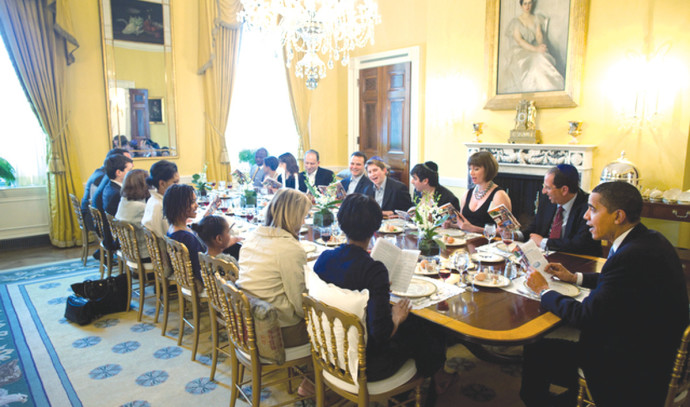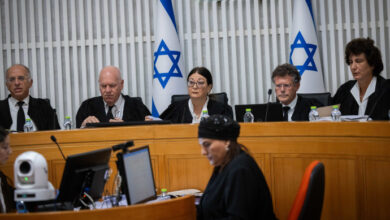Grapevine, May 1, 2024: Negatively predisposed

It certainly takes all kinds to make a world, and it would be a much better world if people focused more on the positive than the negative. On the eve of Passover former US president Barack Obama tweeted: “Tonight Jewish families around the world will begin the celebration of Passover with the traditional seder meal. Michelle and I loved the seders we held in the White House, and the story of Passover with its focus on resilience, redemption and renewal in the face of persecution and uncertainty. Today, it rings even more true.
“This Passover, let’s remember everyone who is unable to celebrate the holiday with their loved ones. And in a time when there’s been so much suffering and loss in Israel and Gaza, let’s reaffirm our commitment to the Jewish people and people of all religions, who deserve to feel safe and secure wherever they live and practice their faith. Chag Sameach.”
There are some Jews who see hostility where it does not exist. Amid the mostly positive replies to the tweet, was one berating Obama with a post that stated: “If you can’t wish Happy Passover without promoting your pro-Palestinian agenda, please refrain from saying anything at all.”
To acknowledge the suffering in Gaza, when it is mentioned daily in the Israeli media, is in no way promoting a pro-Palestinian agenda. It merely acknowledges that there is suffering on all sides of those parties who are involved in the war.
Other responders were quick to come to Obama’s defense and to point out that his message was about Passover and not about the Palestinians.
There are certain members of the Jewish faith who constantly paint Obama as the enemy, forgetting that without Obama’s green light, Israel would not have the Iron Dome. Another thing worth remembering is that a third party who is not a member of either of the warring sides can afford to be friendly with both.
It’s time to stop judging world leaders on whether they are well disposed to Israel’s enemies and detractors. We have to judge them on their relationship with Israel and the Jewish communities in their respective countries.
Mayors write books
■ MAYORS LEAVING office are writing books. Former Beit Shemesh mayor Aliza Bloch was mentioned in a recent column, but she’s not the only one. Shimon Lancry, the immediate past mayor of Acre, has also written a book, On Stormy Water, in which he relates how, as a young man, he became mayor of a city that was seething with corruption and which offered little hope to its residents.
Determined to bring about change, Lancry, against all odds, succeeded in turning Acre into a progressive, forward-looking metropolis with several impressive achievements to its credit.
October 7 to be main subject in books
■ AS FAR as books go, the subject that will have the greatest pull on writers will be October 7 and its aftermath, including the ongoing war, the efforts to bring home the hostages, and the political intrigues that have prevented their return.
Veteran television journalist and military and political analyst Yoav Limor, who believes that there is nothing more urgent than the return of the hostages, has written a book called Heroes. Dedicated to 80 people who demonstrated incredible heroism on October 7, and through whom Limor tells the story of what happened on that awful day, the book will be launched at the HOT Cinema in the Haifa Grand Canyon on Tuesday, May 7.
The launch will include a lecture by the author on the horrendous failure of Israel’s intelligence network, the state of the nation, and what readers can expect to find in the book, plus the screening of a movie, Reality.
National Library collecting writings on October 7
■ THE NUMBER of books that have already been written, are in the works, or will be written in the future about October 7, its effect on the nation, on the region, on countries beyond the Middle East, and its spurring of an antisemitic and anti-Israel tsunami is mind-boggling.
Another journalist, Lee Yaron, has written and has already launched 10/7: 100 Human Stories, which is being published in several languages.
The National Library of Israel some time ago announced that it has started a project whereby it is collecting everything and anything written about October 7 and the ensuing period. That’s going to be quite a challenge for NLI archivists and curators, particularly when books by Holocaust survivors are still being published 80 years after the end of the Second World War.
As it is, the hostages represent three generations – possibly four in terms of age – and the youngest of these will be called upon again and again in coming years to recount their experiences in the spirit of the biblical commandment to “Remember what Amalek did to you.”
‘Never Again’ lip service
■ AFTER THE Second World War and the establishment of the European Union, leaders of member states, in assessing the enormous loss of human life and the needless destruction wrought in so many European villages, towns, and cities, as well as in Japan, swore not to allow anything of this magnitude to be repeated. With regard to the Jewish victims of the Holocaust, world leaders pledged “Never Again.” Given what is happening today, such pledges were little more than lip service.
In an interview with Aryeh Golan during the intermediate days of Passover, former president Reuven Rivlin said that when he meets world leaders or their representatives, he reminds them of “Never Again” and tells them that they have not kept their word.
Surveys show Netanyahu losing ground to Gantz
■ IT HAS been stated in this column that it is not wise for a prime minister to resign in the middle of a war. But Prime Minister Benjamin Netanyahu has made so many faulty and unpopular decisions that a large sector of the public is insistent that he should go and allow someone else to take his place. In surveys published by Maariv, Netanyahu is consistently losing ground and Benny Gantz is gaining.
Writing in Maariv last Friday, former IDF spokesman Avi Bnayahu mounted a virulent attack against the prime minister and his wife for not spending Seder night with the troops, but opting instead to celebrate the Seder in the lap of luxury at the Jerusalem Waldorf Astoria Hotel. Admittedly, they did have a couple of lone soldiers as their guests, but it was not the same as spending Seder night with the troops at an army base or soldiers’ barracks or in their private home.
Bnayahu, who through a long military career served under a series of prime ministers, defense ministers, and chiefs of staff, recalled that all of them either went to spend Seder with the soldiers or invited soldiers to their private homes. In particular, he cited Sonia and Shimon Peres, who invited soldiers to their home in Tel Aviv. She did the cooking and the serving without the help of professional staff, and after the conclusion, Sonia sat and chatted to the soldiers, while Shimon washed the dishes.
When an IDF driver came to take the soldiers back to their barracks, Sonia told them to stay a little longer and to take her car, tour the country, and return the car to her after Passover.
Casting his mind back to prime minister Yitzhak Rabin, who had also been an IDF chief of staff and defense minister, Bnayahu wrote that it was unfortunate that Netanyahu did not have people such as Eitan Haber, Shimon Sheves, and Uri Savir to tell him fearlessly where he was going wrong and to point him back on the right track.
It’s possible that despite all the current ill feeling against him, Netanyahu will retain his seat in the Prime Minister’s Office after the next elections. But it’s more likely that he will suffer a stunning defeat. He is not without admirable achievements; nonetheless, he should resign and leave with his head high rather than be pushed out with his tail between his legs.
Hungarian Embassy to host a Holocaust-related event
■ ALTHOUGH THE Hungarian Embassy has already held a Holocaust-related event, it will hold another on Tuesday, May 7, at 5 p.m. The embassy frequently screens films online. Most recently it was The Revolt of Job. This time it will be Let Ye Inherit (Tell your son).
The film, which is in Hungarian with English subtitles, is about Eva Rosenberg, an elderly peasant woman whose days are filled with all the chores required on a farm.
While she is kneading dough, the camera, for a split second, catches the number on her arm.
Together with her parents and siblings, she was deported to Auschwitz. She was the sole survivor.
The link to the film and the password required for access will be sent by email to viewers shortly before the start of the screening, after which the movie will be available for 24 hours.
On Wednesday, May 8, at 6 p.m., the embassy will host an online roundtable discussion with director Barna Kabay, in the framework of which there will be an opportunity for viewers to ask about both the The Revolt of Job and the documentary Let Ye Inherit (Tell your son).
Anyone wishing to see the film or the roundtable discussion should register by May 6 at (email protected) and indicate to which email address the link and password to the film should be sent. People responding should indicate whether they want to watch one or both programs and how many individuals will be watching together with them.
Yehuda Amichai’s birthday
■ FRIDAY, MAY 3, marks the 100th anniversary of the birth of Israel’s poet laureate Yehuda Amichai, who, though born in Germany, was bound heart and soul to Jerusalem, where he lived and about which he wrote extensively.
Strangely, his centenary will be marked in Tel Aviv at the Bialik Museum on Thursday, May 2, with Erez Biton heading a list of major literary figures who will each pay tribute to Amichai, who died in 2000, leaving behind a rich legacy of creative thought.
The 100-years-old Holocaust survivor still driving a car
■ HOW MANY 100-year-old Auschwitz survivors are still driving a car? Dan Hadani, a retired photojournalist. Hadani is among those iconic photographers who documented much of the history of Israel in its first half century and even later.
Some of the others include Micha Bar-Am, 94; Werner Braun, who died in 2018 at the age of 100; David Rubinger, who died in 2017, and who like Hadani was born in 1924; Jerusalem-born David Harris, who died in 2008 at age 79; plus others whose historic photographs can be found in the state archives, the Zionist archives, and the archives of state institutions.
Currently recognized as Israel’s leading photojournalist is Tel Aviv-born Israel Prize laureate Alex Levac, 79.
Hadani, who was born in Lodz, Poland, has been in the news lately not only because he still drives a car at his advanced age, but because he is also a Holocaust survivor – the sole survivor of his family – and because, in addition to being a photographer, he established a photo news service (Israel Press and Photo Agency), through which he hired the services of numerous photographers and owned the rights of photographs they took while on assignment from IPPA.
In this way, together with his own photographs, he amassed a collection of some two million images of public figures and important events which were meticulously documented.
Hadani operated IPPA for 35 years, from 1965 to 2000, supplying significant photographs to newspapers and magazines in Israel and around the world.
Eager to ensure that his archive would not be discarded after he was no longer around to care for it, he presented it to the NLI in 2016, but has been and continues to be a frequent visitor to check that it is being properly preserved. He also lectures to groups of schoolchildren who visit the library.
It gives library staff members a sense of awe that a person of a triple-digit age who has lived through so much, including IDF service in the navy and in the Intelligence Corps plus a stint in the office of the IDF Spokesman, can tell them firsthand about a period of Jewish and Israeli history through which he lived long before they were born.
The word ‘old’ slowly disappearing
■ IN THE evolution of language and ideas, the word “old” is slowly disappearing with regard to senior citizens – mainly because seniors of an advanced age are living longer, are healthier, keep their jobs well beyond retirement age, and are more active mentally and physically, contributing to academic achievements, participating in sports, protest demonstrations, military service, and even national and international beauty contests.
In the latter case, an announcement made by the Miss Universe Organization in September 2023 to the effect that contestants may now be aged from 18 to any age has been tried and proven. Up until then, the cutoff age was 28. Now, women of any age and size are eligible, including those who have given birth – another former rule that was eliminated.
A 60-year-old lawyer and journalist in Argentina has been crowned Miss Universe Buenos Aires, and this month will compete in the Miss Universe Argentina pageant. If she wins, Alejandra Rodriguez will go on to compete for the Miss Universe title later this year.
Nava Barak’s biography
■ WHILE SOME people bear telltale marks of age by way of wrinkles, liver spots, protruding veins, swollen ankles, double chins, and turkey necks, others manage to maintain a chiseled profile, minimal wrinkles, and none of the other giveaways.
One such person is Nava Barak, 77, who recently retired after a long career as president of Elem, the organization that cares for at-risk youth. Barak looks nowhere near her age.
Barak and her first husband, Ehud Barak, separated some 20 years ago, and she has been married to her second husband, Shalom Zinger, for 15 years.
In an interview that she gave to Yediot Aharonot after stepping down from Elem, Barak said that when growing up in Tiberias, she never imagined that she would come as far as she has. Of course, it helps when one is married to someone whose CV includes IDF chief of staff, defense minister, and prime minister. During her marriage to Ehud Barak she met many world leaders and other international figures of note.
On one occasion she came home to the house she shared with Ehud in Kochav Yair and found Yasser Arafat and Mahmoud Abbas seated at her dining room table discussing peace in an amicable conversation with her husband. Later, she walked them out to the helicopter that was waiting for them.
Even though the atmosphere had been decidedly cordial, the Second Intifada erupted two weeks later.
It’s interesting that although Barak and her ex have each remarried, she retains his surname – maybe because it has just a little more status than the surname of her current spouse.
Avi Rifkind, Israel’s pioneer of trauma treatment
■ INCIDENTALLY, ON the subject of age, Israel’s best known pioneer of trauma treatment, Avi Rifkind, who received injured National Security Minister Itamar Ben-Gvir following his motor accident and his request to be transferred from Shamir Medical Center to Hadassah, is past retirement age and still going strong.
While Ben-Gvir is far from the flavor of the month, those people who filed nasty social media posts following news of the incident should be a little more charitable. Admittedly, Ben-Gvir espouses racist ideas and is a serial troublemaker, but he’s not Hamas and does not deserve to be cursed in the same way as Hamas is cursed.
In-depth studies of what is happening in the Jewish world
■ EVERY SUMMER the Shalom Hartman Institute in Jerusalem hosts a community leadership program which attracts scholars, philanthropists, and community leaders from abroad – mostly the United States but also from many parts elsewhere.
These programs offer in-depth studies of what is happening in the Jewish world, especially in Israel; explorations of Jewish thought; educational field trips that offer a variety of perspectives of Israel’s post-October 7 society; and much more.
Among the speakers are Yehuda Kurtzer, Donniel Hartman, Elana Stein Hain, Tal Becker, and Yossi Klein Halevi.
The program runs from June 26 to July 3. Space is limited, and the deadline for registration is May 10.
According to Jordanna Amsel, the director of the community leadership program at the institute, there is an unprecedented demand for participation this year.
In all probability, this is due to the serious threats to Israel’s existence, the need for many Jews to feel part of what Israel is experiencing, and also a need to share experiences of rising antisemitism and how to combat it.
Registration details are available on the Harman Institute website.
Rabbi’s song highjacked by anti-Israel campus protestors
■ GENERALLY SPEAKING, a songwriter is thrilled when lots of people start singing his composition or it is frequently played by DJs.
Not so Rabbi Menachem Creditor, scholar in residence for UJA-Federation of New York. He is angry that a song he wrote has been hijacked by anti-Israel campus protesters.
Creditor, who is married to celebrity interfaith singer Neshama Carlebach, who is the daughter of Rabbi Shlomo Carlebach, composed the song “Olam Hessed Yibaneh” (We will build this world from love), which he composed in 2002 for the naming ceremony of his oldest child.
The Hebrew used in the song comes from the Book of Psalms, and Creditor composed the melody and wrote the English lyrics.
Since October 7, he has been horrified to learn that the song has been used by student groups in campus protests against the State of Israel, including at Columbia and Yale. Worse still, he was distraught to discover that the song was used by a small number of Jewish students at Yale to close a public Seder being held inside one of the protest encampments. Some media outlets even captured the protesting students singing the song, linked arm in arm, providing a sympathetic portrayal of their participation in the violent anti-Israel protests that are rapidly rising in intensity at campuses across the country.
Creditor adamantly objects to the song being used in any context that negatively affects the State of Israel or the Jewish people.
Those who are using the song, he says, are misappropriating the message of love and support for Israel, and solidarity with the hostage families and their loved ones still in captivity.
Seudat Hamashiah
■ IN HASSIDIC circles, late on Monday afternoon, the last day of the weeklong Passover festival, people gathered for yet another banquet-style meal called Seudat Hamashiah (the feast of the Messiah).
The custom was introduced by the founder of Hassidism, the Baal Shem Tov (master of the good name).
Among the various hassidim hosting Messiah Feasts in Jerusalem, were Rabbi Yisroel Goldberg and his wife, Shoshi, who were also celebrating the fact that Chabad of Rehavia has moved into new, larger premises.
The Goldbergs put up posters and also advertised the feast on social media platforms, but didn’t bargain for as large a response as they received. While a lot of the guests were Chabadniks, at least a third were not, judging by their attire.
Fortunately, Shoshi Goldberg and her children who help set up these events always have extra, in case it’s needed.
This time they were busy trying to find a place to put out chairs for the overflow of guests who kept arriving for more than an hour after the start of the proceedings. Somehow, despite the crowding in both the men’s and the women’s sections, room was found for everyone, and more food kept appearing on the tables.
Rabbi Goldberg tirelessly kept explaining in Hebrew and English what it was all about, and why the Messiah has not yet come. Every now and again, Goldberg energetically whipped up the crowd into song.





